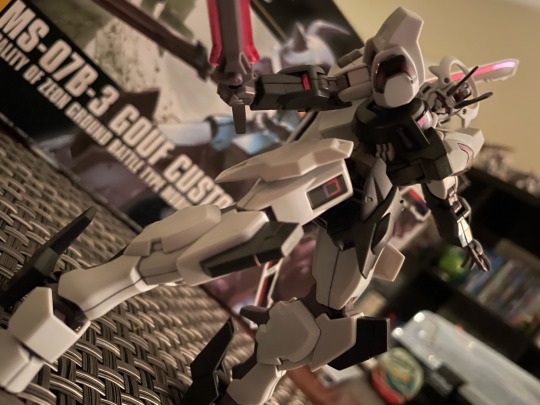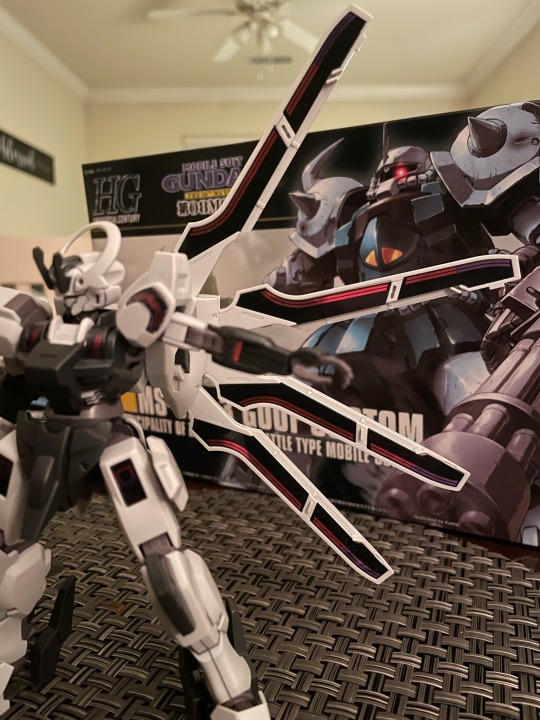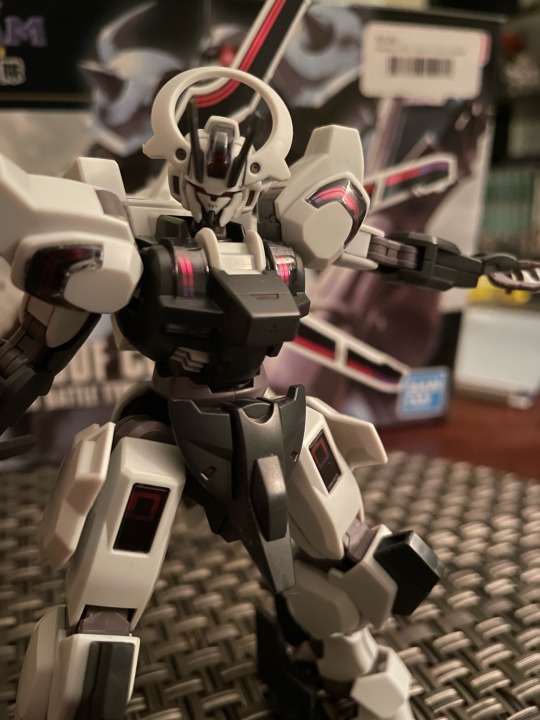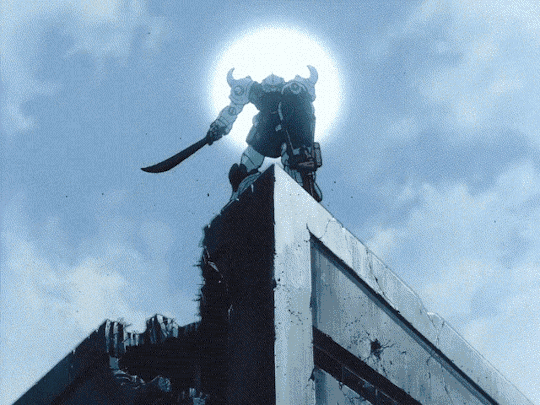#like they use so many fucking poly caps it’s wild
Text
Oh yea I built Schwarzette



All of the WFM kits have been excellent build experiences. But I kinda find myself wishing this one had a few more panel lines out of box.
As a surprise twist the next kit is the HG Gouf Custom!

#that line needs new HGs#like they use so many fucking poly caps it’s wild#esp after coming off of schwarzette#gunpla#gundam#gundam schwarzette#witch from mercury#8th ms team
21 notes
·
View notes
Text
Time for some OCs!
I have so many, pls send help. Feel free to ask me abt any of them!!
Under a cut so I don’t kill u all lmao
Bioshock! (aka my absolute oldest OCs at uh. 5+ years)
Loretta. She’s the only one I talk about but it’s only because I love her. Saved from being a Sister as a kid, she ended up splicing and running riot in Arcadia.
Jo. He was Loretta’s favourite Big Daddy, but since he’s so old now he’s mostly broken and just drifts around Arcadia making sad whale noises :(
Lauren is an ex-Sister circa Bioshock 2, who instead of going to the surface with Eleanor stays behind and is adopted by Loretta.
Anna. Lauren’s closest friend since before they were Sisters, and stuck together once they were turned, too. Also “adopted” by Loretta.
Borderlands
Quinn. Ex-raider, ass kicker, and all around asshole. She has the hots for Mordecai but won’t admit it. She also has a pet skag and stalker.
Leo. Also an asshole but on a much more acceptable scale. He kind of unofficially joined the Crimson Raiders but can’t remember how.
Sydney. They’re the most terrifying 12 year old anyone will ever meet. They were adopted by Leo after he found them stowing away on a bandit ship.
DA Inquisition
Nadira. She’s basically a prophet that was given the gift of visions after she died and a compassion spirit felt bad for her. Don’t ask how because I don’t know :P
Liv. Nadira’s best friend, and the one who sort of accidentally started a local legend about her. She’s also the blushiest baby of a Qunari ever.
Myrae. Liv’s twin and the more serious of the two. She’s painfully anti-social but forces herself for the sake of the Inquisition.
Dark Angel (does anyone else know this exists?)
Ambrosia. An over stressed medic who tries her best. She has a daughter named Sunshine but doesn’t know who the dad is.
Angelica. She used to be a mercenary hired to kill shitty people like abusers and rapists. Now she’s a medic under Ambrosia’s wing.
Gabriella. She’s a mechanic and supply smuggler on the side, and has been caught too many times. Has the hots for everyone and will make it known.
Tamara. The daughter of a rich business man, Tammy ditched her family to help those in need. Using money stolen from her father’s company.
Fallout
Hartley. Another one I mention sometimes! She’s a hardcore Commonwealth lady who will kill for caps. She lives in Croup Manor with a bunch of others.
Atlas. Hartley’s sort-of boyfriend and also a super mutant. He signed up to the Institute’s FEV experiments not knowing what that meant. Idiot.
Nixon. The resident ghoul genius, this kid can make anything from the most basic scraps. He even made his own synth with stolen tech.
Tequila. The synth in question. Technically only four, she has the intelligence of a twenty year old. She’s agender but uses all pronouns.
Carrion. Travels with their pet/bodyguard deathclaw named Lazarus. They were part of a vault experiment to infuse deathclaw DNA into a human.
Fullmetal Alchemist
Andrea. She’s a young State Alchemist using the moniker ‘Lightning Alchemist’ for the way she uses alchemic tattoos to create weather-like effects.
Rosie. A self taught automail and car mechanic. Rosie is extremely anti-social and often communicates through her brother.
Evan. Rosie’s twin, although they look nothing alike. Although he works front desk at Central Command, State Alchemists terrify him.
Mad Max (my BOYS!)
Spider. He used to help the Organic Mechanic, but blood bags don’t cut it anymore and he’s close to death. Post-movie he has a raging crush on Capable.
Crimson. The shittiest, most infuriating man on earth. He’s an excellent driver, with many battle scars to prove it.
Cable. He’s Crimson’s lancer. Given his name by the way he wears cables as jewellery, and the fact he was burned by an electrical fire.
Hammer. He was born to Joe and a Milk Mother, though thrown to the Wastes. Now he’s a brutal lancer that uses his bulk to his advantage.
Lagarto. He’s Hammer’s driver, although at only 4′11 he has to prove himself constantly. Crimson’s boyfriend, though the relationship doesn’t last.
Cepheus. Cepheus was named after a constellation he found in a book. Entirely deaf since birth, but one of the Imperators’ most trusted Warboys.
Mass Effect
Camilla. A Commander of a ship, a true leader, Cammy is a force to be reckoned with. Especially since she looks after four krogan kids, a human, and a salarian.
Garst. Cammy’s ‘husband’ and an excellent soldier class. He used to live on Omega before Cammy picked him up.
Hayley. Cammy and Garst’s adopted kid, Hayley is a bit of a wild child. She has a pet varren named Pickles, though no one knows how she tamed him.
Chanyi. Hayley’s girlfriend, and an angel of a quarian. Her mother died on Omega and Garst took her in.
My Hero Academia
Akari. Akari’s Quirk gives her incredibly strong empathy and the ability to influence emotions. She feels bad using her Quirk, though.
Riko. Riko can rapidly grow bones from her limbs, snapping them off and fashioning them into weapons. She loves grossing people out.
Takara. The daughter of a Pro Hero and a scientist, Takara is overpowered as fuck. She’s also horrendously arrogant about it.
Trollhunters
Roisin. A teacher at Arcadia Oaks High, she accidentally got involved in Jim’s troll nonsense. She has a crush on Blinky, the madwoman.
Una. Roisin’s kid sister, Una is actually a Krubera changeling that ditched the order because she loved her human family too much.
XMen
Alina. Nicknamed ‘Songbird’ for the way her voice can put people to sleep - or cause brain haemorrhage. Her choice.
Bethany. Definitely wants to bang Hank McCoy and is overly defensive about it. She teaches English at the mansion - and her nephew goes there too.
Daisy. She literally got into a fist fight with anti-mutant protesters, which ended in her nearly dying. She still thinks it was well worth it.
Lydia. She’s a nurse in training and ends up helping the mansion after an attack. She can induce hallucinations but prefers to use it to soothe people.
Hayley. Literally Rapunzel, with meters of prehensile hair as strong as steel. She’s barely five foot and has never hurt a soul, but she can threaten.
Cassandra. A lingerie model with a killer body, Alina uses it to take the attention away from the enormous eagle wings attached to her back.
I’ve Been Dreaming! (My first original project!)
Delinna. Although not literally a demon, the red skin and horns have earned her species that nickname. Poly dating Red and Keavyn, who she loves a lot.
Red. Extremely round and extremely shy. His name is actually Allistair but he goes by Red due to his bright auburn hair.
Carisey. Delinna’s little sister, and a right troublemaker. She’s at college mechanical engineering, and is scarily good at it.
Keavyn. He has his own Youtube channel where he posts gaming and ghost hunting videos. Once tricked Red into a ghost hunt and regretted it.
Claire. She’s blind, and her eyes literally look like space; complete with tiny planets. She doesn’t know how, but sometimes her dreams are prophecies.
Josh. A boy with too many eyes and not enough patience. Amusingly he’s dating Claire, and he’s all too aware of the irony.
Gator Land
Khadija. Her father is basically a mad scientist that created loads of sentient “monster people”. Khadija is now best friends with all of them.
Sebastian. Is he alligator or human? Both. Although he’s painfully shy it doesn’t stop him from wanting to live as a human. Or from crushing on Khadija.
Coco. She has no mouth and a geode for a stomach. It’s unknown if she’s more living creature or more gemstone.
Cloud. A fluffy skull-headed boy who’s fur changes colour with the seasons. He kind of looks like a humanoid cubone.
Sonnet. A shy fish boy who loves poetry and fantasy novels. He will cry if you say anything mean to him.
2 notes
·
View notes
Text
chapter 5
paragraph xii
Before Boris, I had borne my solitude stoically enough, without realizing quite how alone I was. And I suppose if either of us had lived in an even halfway normal household, with curfews and chores and adult supervision, we wouldn’t have become quite so inseparable, so fast, but almost from that day we were together all the time, scrounging our meals and sharing what money we had.
In New York, I had grown up around a lot of worldly kids—kids who’d lived abroad and spoke three or four languages, who did summer programs at Heidelberg and spent their holidays in places like Rio or Innsbruck or Cap d’Antibes. But Boris—like an old sea captain—put them all to shame. He had ridden a camel; he had eaten witchetty grubs, played cricket, caught malaria, lived on the street in Ukraine (“but for two weeks only”), set off a stick of dynamite by himself, swum in Australian rivers infested with crocodiles. He had read Chekhov in Russian, and authors I’d never heard of in Ukrainian and Polish. He had endured midwinter darkness in Russia where the temperature dropped to forty below: endless blizzards, snow and black ice, the only cheer the green neon palm tree that burned twenty-four hours a day outside the provincial bar where his father liked to drink. Though he was only a year older than me—fifteen—he’d had actual sex with a girl, in Alaska, someone he’d bummed a cigarette off in the parking lot of a convenience store. She’d asked him if he wanted to sit in her car with her, and that was that. (“But you know what?” he said, blowing smoke out of the corner of his mouth. “I don’t think she liked it very much.”
“Did you?”
“God, yes. Although, I’m telling you, I know I wasn’t doing it right. I think was too cramped in the car.”)
Every day, we rode home on the bus together. At the half-finished Community Center on the edge of Desatoya Estates, where the doors were padlocked and the palm trees stood dead and brown in the planters, there was an abandoned playground where we bought sodas and melted candy bars from the dwindling stock in the vending machines, sat around outside on the swings, smoking and talking. His bad tempers and black moods, which were frequent, alternated with unsound bursts of hilarity; he was wild and gloomy, he could make me laugh sometimes until my sides ached, and we always had so much to say that we often lost track of time and stayed outside talking until well past dark. In Ukraine, he had seen an elected official shot in the stomach walking to his car—just happened to witness it, not the shooter, just the broad-shouldered man in a too-small overcoat falling to his knees in darkness and snow. He told me about his tiny tin-roof school near the Chippewa reservation in Alberta, sang nursery songs in Polish for me (“For homework, in Poland, we are usually learning a poem or song by heart, a prayer maybe, something like that”) and taught me to swear in Russian (“This is the true mat —from the gulags”). He told me too how, in Indonesia, he had been converted to Islam by his friend Bami the cook: giving up pork, fasting during Ramadan, praying to Mecca five times a day. “But I’m not Muslim any more,” he explained, dragging his toe in the dust. We were lying on our backs on the merry-go-round, dizzy from spinning. “I gave it up a while back.”
“Why?”
“Because I drink.” (This was the understatement of the year; Boris drank beer the way other kids drank Pepsi, starting pretty much the instant we came home from school.)
“But who cares?” I said. “Why does anybody have to know?”
He made an impatient noise. “Because is wrong to profess faith if I don’t observe properly. Disrespectful to Islam.”
“Still. ‘Boris of Arabia.’ It has a ring.”
“Fuck you.”
“No, seriously,” I said, laughing, raising up on my elbows. “Did you really believe in all that?”
“All what?”
“You know. Allah and Muhammad. ‘There is no God but God’—?”
“No,” he said, a bit angrily, “my Islam was a political thing.”
“What, you mean like the shoe bomber?”
He snorted with laughter. “Fuck, no. Besides, Islam doesn’t teach violence.”
“Then what?”
He came up off the merry-go-round, alert gaze: “What do you mean, what? What are you trying to say?”
“Back off! I’m asking a question.”
“Which is—?”
“If you converted to it and all, then what did you believe?”
He fell back and chortled as if I’d let him off the hook. “Believe? Ha! I don’t believe in anything.”
“What? You mean now?”
“I mean never. Well—the Virgin Mary, a little. But Allah and God…? not so much.”
“Then why the hell did you want to be Muslim?”
“Because—” he held out his hands, as he did sometimes when he was at a loss—“such wonderful people, they were all so friendly to me!”
“That’s a start.”
“Well, it was, really. They gave me an Arabic name—Badr al-Dine. Badr is moon, it means something like moon of faithfulness, but they said, ‘Boris, you are badr because you light everywhere, being Muslim now, lighting the world with your religion, you shine wherever you go.’ I loved it, being Badr. Also, the mosque was brilliant. Falling-down palace—stars shining through at night—birds in the roof. An old Javanese man taught us the Koran. And they fed me too, and were kind, and made sure I was clean and had clean clothes. Sometimes I fell asleep on my prayer rug. And at salah, near dawn, when the birds woke up, always the sound of wings beating!”
Though his Australo-Ukrainian accent was certainly very odd, he was almost as fluent in English as I was; and considering what a short time he’d lived in America he was reasonably conversant in amerikanskii ways. He was always poring through his torn-up pocket dictionary (his name scrawled in Cyrillic on the front, with the English carefully lettered beneath: BORYS VOLODYMYROVYCH PAVLIKOVSKY) and I was always finding old 7-Eleven napkins and bits of scratch paper with lists of words and terms he’d made:
bridle and domesticate
celerity
trattoria
wise guy = кpymoŭ пaцaн
propinquity
Dereliction of duty.
When his dictionary failed him, he consulted me. “What is Sophomore?” he asked me, scanning the bulletin board in the halls at school. “Home Ec? Poly Sci?” (pronounced, by him, as “politzei”). He had never heard of most of the food in the cafeteria lunch: fajitas, falafel, turkey tetrazzini. Though he knew a lot about movies and music, he was decades behind the times; he didn’t have a clue about sports or games or television, and—apart from a few big European brands like Mercedes and BMW—couldn’t tell one car from another. American money confused him, and sometimes too American geography: in what province was California located? Could I tell him which city was the capital of New England?
But he was used to being on his own. Cheerfully he got himself up for school, hitched his own rides, signed his own report cards, shoplifted his own food and school supplies. Once every week or so we walked miles out of our way in the suffocating heat, shaded beneath umbrellas like Indonesian tribesmen, to catch the poky local bus called the CAT, which as far as I could tell no one rode out our way except drunks, people too poor to have a car, and kids. It ran infrequently, and if we missed it we had to stand around for a while waiting for the next bus, but among its stops was a shopping plaza with a chilly, gleaming, understaffed supermarket where Boris stole steaks for us, butter, boxes of tea, cucumbers (a great delicacy for him), packages of bacon —even cough syrup once, when I had a cold—slipping them in the cutaway lining of his ugly gray raincoat (a man’s coat, much too big for him, with drooping shoulders and a grim Eastern Bloc look about it, a suggestion of food rationing and Soviet-era factories, industrial complexes in Lviv or Odessa). As he wandered around I stood lookout at the head of the aisle, so shaky with nerves I sometimes worried I would black out—but soon I was filling my own pockets with apples and chocolate (other favored food items of Boris’s) before walking up brazenly to the counter to buy bread and milk and other items too big to steal.
Back in New York, when I was eleven or so, my mother had signed me up for a Kids in the Kitchen class at my day camp, where I’d learned to cook a few simple meals: hamburgers, grilled cheese (which I’d sometimes made for my mother on nights she worked late), and what Boris called “egg and toasts.” Boris, who sat on the countertop kicking the cabinets with his heels and talking to me while I cooked, did the washing-up. In the Ukraine, he told me, he’d sometimes picked pockets for money to eat. “Got chased, once or twice,” he said. “Never caught, though.”
“Maybe we should go down to the Strip sometime,” I said. We were standing at the kitchen counter at my house with knives and forks, eating our steaks straight from the frying pan. “If we were going to do it, that’d be the place. I never saw so many drunk people and they’re all from out of town.”
He stopped chewing; he looked shocked. “And why should we? When so easy to steal here, from so big stores!”
“Just saying.” My money from the doormen—which Boris and I spent a few dollars at a time, in vending machines and at the 7-Eleven near school that Boris called “the magazine”—would hold out a while, but not forever.
“Ha! And what will I do if you are arrested, Potter?” he said, dropping a fat piece of steak down to the dog, whom he had taught to dance on his hind legs. “Who will cook the dinner? And who will look after Snaps here?” Xandra’s dog Popper he’d taken to calling ‘Amyl’ and ‘Nitrate’ and ‘Popchik’ and ‘Snaps’—anything but his real name. I’d started bringing him in even though I wasn’t supposed to because I was so tired of him always straining at the end of his chain trying to look in at the glass door and yapping his head off. But inside he was surprisingly quiet; starved for attention, he stuck close to us wherever we went, trotting anxiously at our heels, upstairs and down, curling up to sleep on the rug while Boris and I read and quarrelled and listened to music up in my room.
“Seriously, Boris,” I said, pushing the hair from my eyes (I was badly in need of a haircut, but didn’t want to spend the money), “I don’t see much difference in stealing wallets and stealing steaks.”
“Big difference, Potter.” He held his hands apart to show me just how big. “Stealing from working person? And stealing from big rich company that robs the people?”
“Costco doesn’t rob the people. It’s a discount supermarket.”
“Fine then. Steal essentials of life from private citizen. This is your so-smart plan. Hush,” he said to the dog, who’d barked sharply for more steak.
“I wouldn’t steal from some poor working person,” I said, tossing Popper a piece of steak myself. “There are plenty of sleazy people walking around Vegas with wads of cash.”
“Sleazy?”
“Dodgy. Dishonest.”
“Ah.” The pointed dark eyebrow went up. “Fair enough. But if you steal money from sleazy person, like gangster, they are likely to hurt you, nie?”
“You weren’t scared of getting hurt in Ukraine?”
He shrugged. “Beaten up, maybe. Not shot.”
“Shot?”
“Yes, shot. Don’t look surprised. This cowboy country, who knows? Everyone has guns.”
“I’m not saying a cop. I’m saying drunk tourists. The place is crawling with them Saturday night.”
“Ha!” He put the pan down on the floor for the dog to finish off. “Likely you will end up in jail, Potter. Loose morals, slave to the economy. Very bad citizen, you.”
#boreo#the goldfinch#the goldfinch donna tart#donna tart#boris pavlikovsky#theodore decker#theo decker#boris x theo#theo x boris#finn wolfhard#ansel elgort#oakes fegley#aneurin barnard#the goldfinch book#book#books#quote#quotes#lgbtq#lgbtqia#lgbtqia+#lgbt#gay#gay ship#gay ships#otp#mlm#the goldfinch quotes#the goldfinch quote#boreo quotes
1 note
·
View note